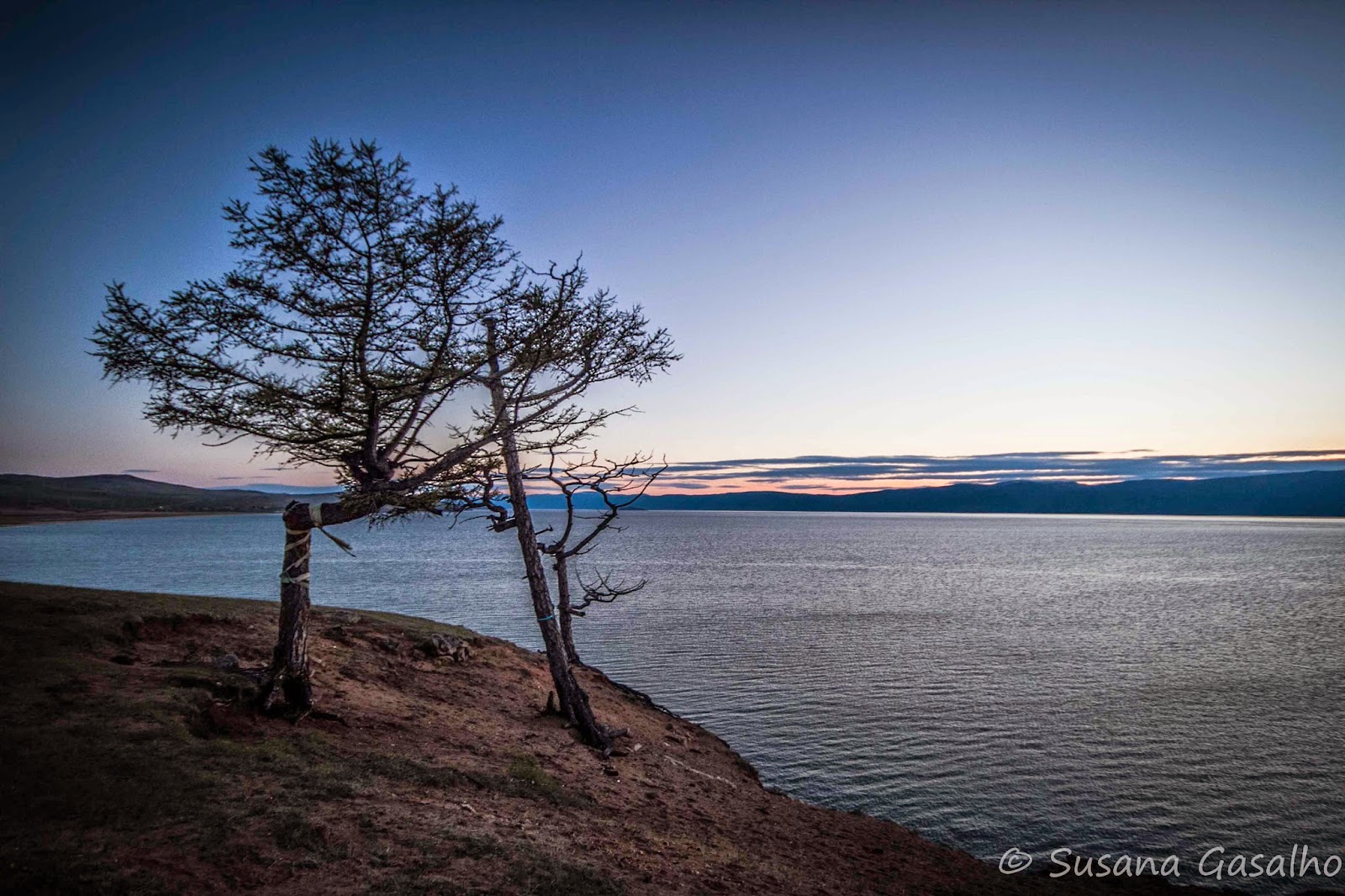 |
| Lake Baikal from Olkhon in the evening |
 |
| Shaman rock and a prayer's point |
 |
| Lake Baikal |
 |
| Digging a hole for our couchsurfing host |
 |
| Our home for a few days |
 |
| Beach on the island |
 |
| View to lake Baikal |
 |
| Lake Baikal from Olkhon island |
 |
| Pine trees |
 |
| Shaman rock |
Olkhon é
a maior das ilhas do lago Baikal com 71,5 Km de comprimento e 20,8 Km de
largura. Os mongóis crêem que, segundo antigas lendas, ela é o centro do universo.
É grande
o suficiente para ter os seus próprios lagos e é composta por suaves colinas (o
ponto mais alto, Monte Zhima, tem 818m acima do nível das águas do lago),
estepes e uma densa floresta na parte Nordeste da ilha.
Tem
algumas longas praias de areia, mas noutros locais a terra acaba abruptamente
no lago, o que lhe confere uma atmosfera selvagem e intacta, com belas
paisagens sobre as águas límpidas.
O lago
Baikal, localizado no sul da Siberia, tem 25 milhões de anos e é o maior lago
de água doce do mundo. Contém aproximadamente 22% de todas as reservas de água
doce (não gelada) do mundo e é o mais profundo lago do planeta (1640m). Está
também entre os lagos com as águas mais límpidas, tendo uma flora e fauna muito
ricas: mais de 3500 espécies das quais ¾ são endémicas. Foi declarado
Património do Mundo pela UNESCO em 1996.
Está
completamente rodeado por montanhas e alberga também os Buryat, uma tribo que
reside no lado leste do lago de origem mongol (provavelmente descendetes do
Genghis Khan).
No
Inverno o lago gela e é possível caminhar sobre ele e fazerem-se desportos da
estação assim como alugar trenós puxados por cães.
Nós
ficámos 4 dias na ilha, em casa de um russo que, gentilmente, oferece um espaço
para dormir e cozinhar em troca de alguns trabalhos, no nosso caso, ele
precisava de gente para cavar um buraco para uma nova “casa-de-banho”.
No mesmo
espaço estiveram connosco o Léo e a Julie, outro casal francês e um casal
alemão que viaja pelo mundo. A cidade principal da ilha, Khuzir, tem 2 pequenos
mercados com produtos obviamente caros por serem escassos e alguns hotéis. As
estradas não são pavimentadas, só o hotel principal tem canalizações, de resto
a água utilizada pelos locais é recolhida no lago, e as vacas deambulam
livremente na sua busca por alimento.
Há alguns
locais que organizam tours e actividades mas é dificil perceber o horário de
funcionamento das coisas, e o hotel principal (Nikita’s) parece ter o monopólio
das actividades da ilha.
//
Olkhon is
the largest island of Baikal Lake with 71.5 km long and 20.8 km wide.
Mongolians believe that, according to ancient legends, it is the center of the
universe.
It's big
enough to have its own lakes and consists of rolling hills (the highest point,
Mount Zhima, is 818m above the lake’s water level), and a dense forest steppe
in the Northeastern part of the island.
It has
some long sandy beaches, but at some places the land ends abruptly at the lake,
giving it a wild and unspoilt atmosphere, with wonderful views over the clear
waters.
The
Baikal Lake, located in southern Siberia, is 25 million years old and is the
largest freshwater lake in the world. Contains approximately 22% of all
freshwater bodies (not icy) in the world and is the deepest lake in the world
(1640m). It is also among the lakes with most clear water, having a very rich
flora and fauna: over 3500 species of which ¾ are endemic. It was declared UNESCO World Heritage in 1996.
Is
completely surrounded by mountains and also houses the Buryat, a tribe that
lives on the east side of the lake, of Mongolian origin (probably descendetes
of Genghis Khan).
In winter
the lake freezes and you can walk on it and make season sports as well as rent
dogsleds.
We stayed
for four days on the island, in the home of a Russian who kindly offers a space
to sleep and cook in exchange for some work. In our case he needed people to
dig a hole for a new "toilet".
In the same
space were with us, Leo and Julie, another French couple and a German couple
who travel the world. The island's main town, Khuzir, has 2 small markets with
obviously expensive products because they are scarce and some hotels. The roads
are not paved, only the main hotel has plumbing, moreover the water used is by
the locals is collected from the lake, and cows roam freely in their search for
food.
There are
some places that organize tours and activities but it is hard to understand the
working hours of things, and the main hotel (Nikita's) seems to have a monopoly
on island activities.








